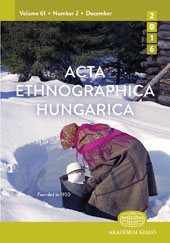Lingering Nomad Ideology in 21st Century Mongolia
Lingering Nomad Ideology in 21st Century Mongolia
Author(s): Zsolt SzilágyiSubject(s): Ethnohistory, Social development, Transformation Period (1990 - 2010), Globalization, Identity of Collectives
Published by: Akadémiai Kiadó
Keywords: Mongolia; nomad traditions; social changes in Mongolia; national traditions; national and/or nomadic ideology;
Summary/Abstract: A specific economic and social realignment can be observed in Mongolia nowadays. Due to the rapid transformation in the last two and a half decades, the mentality and way of life of Mongolian people have also changed to a great degree and a specific national or nomadic ideology has appeared and gradually strengthened, which has become one of the pillar of national identity. This ideology is shared in many respects by Mongolians, living not only in Mongolia, but China and Inner Asia too. In the economic environment the Mongolian society is changing at an accelerated speed. The urban population is getting far from the nomadic way of life and has started to follow behavioural models that are very different from the traditional patterns. With the regression of nomadism one of the fundamental constituents of the Mongolian culture seems to disappear. Although in the last 25 years Mongolians have increasingly adapted to the globalized culture, the tradition of Genghis has not totally vanished, what is more, nowadays it revives. The need for independent cultural identity is getting stronger. It plays a role in elaborating economic strategies that are adaptable to the changed environment. It can be observed, for example, in turnout of shamans in the towns, in the changes of the Buddhist Church’s social functions or in the “pretended” nomadic lifestyle around the main destination of tourism.
Journal: Acta Ethnographica Hungarica
- Issue Year: 61/2016
- Issue No: 1
- Page Range: 197-211
- Page Count: 15
- Language: English
- Content File-PDF

